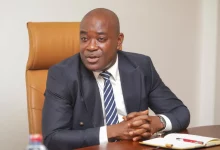At long last, the Executive Board of the International Monetary Fund (IMF) has approved the long-awaited $3-billion bailout being sought by Ghana to reset its economy to ease the hardship in the country.
The IMF granted the approval at the Board’s meeting held on Wednesday.
According to the arrangement, the IMF will disburse the three-year extended credit in batches, releasing $600 million as the first tranche, with the rest coming in tranches every six months.
On Thursday, the Governor of the Bank of Ghana (BoG), Dr Ernest Kwamina Yedu Addison, announced at the IMF and the Finance Ministry joint press conference that the first tranche would hit the bank’s account on Friday (that is, yesterday) because the BoG had received a swift advice regarding that.
We are happy to hear the Official Creditor Committee on Ghana alluding to the strong reform programme being pursued by the government to restore macroeconomic stability and debt sustainability while laying the foundation for an inclusive recovery for which the country deserves the assistance.
That, for us, means Ghana has proven its qualification and readiness for the credit facility but the question is, will the country abide by all that it has to do to receive the rest of the money and also make the current assistance benefit the whole country?
Already, the country has been to the IMF for a bailout 16 times but could not stop at that and so we are at it again the 17th time.
For all the previous bailouts, the country’s authorities showed that all would be well, yet things went haywire.
In fact, the 17th request was unexpected because the Akufo-Addo administration vowed not to go in for it but certain circumstances like COVID-19 and the Russia-Ukraine war have combined to force it to do so against its word.
This is understandable because there can always be circumstances beyond our control, but what about those that can be under our control?
Some expert sources say certain negative practices have become the bane of the country’s economic progress, including non-compliance with certain IMF stipulations, corruption, over-spending by the government and the low ratio of tax revenue to the country’s Gross Domestic Product.
Regarding the IMF stipulations, for instance, the Director of the Institute of Statistical, Social and Economic Research (ISSER) at the University of Ghana, Prof. Peter Quartey, has called on the government to assiduously work to meet the IMF bailout conditions.
The ISSER Director explains that if the country fails to meet the targets, come a review, the next tranche might not come.
We think the government cannot afford such an embarrassment.
But while we say this, we still want to appeal that there is the need to check corruption among state officials and over-spending for political expediency; and pursue all the necessary efforts to raise the ratio of tax revenue to GDP from the current 13 per cent to 25 per cent which the experts say can help bring some relief to the country.



